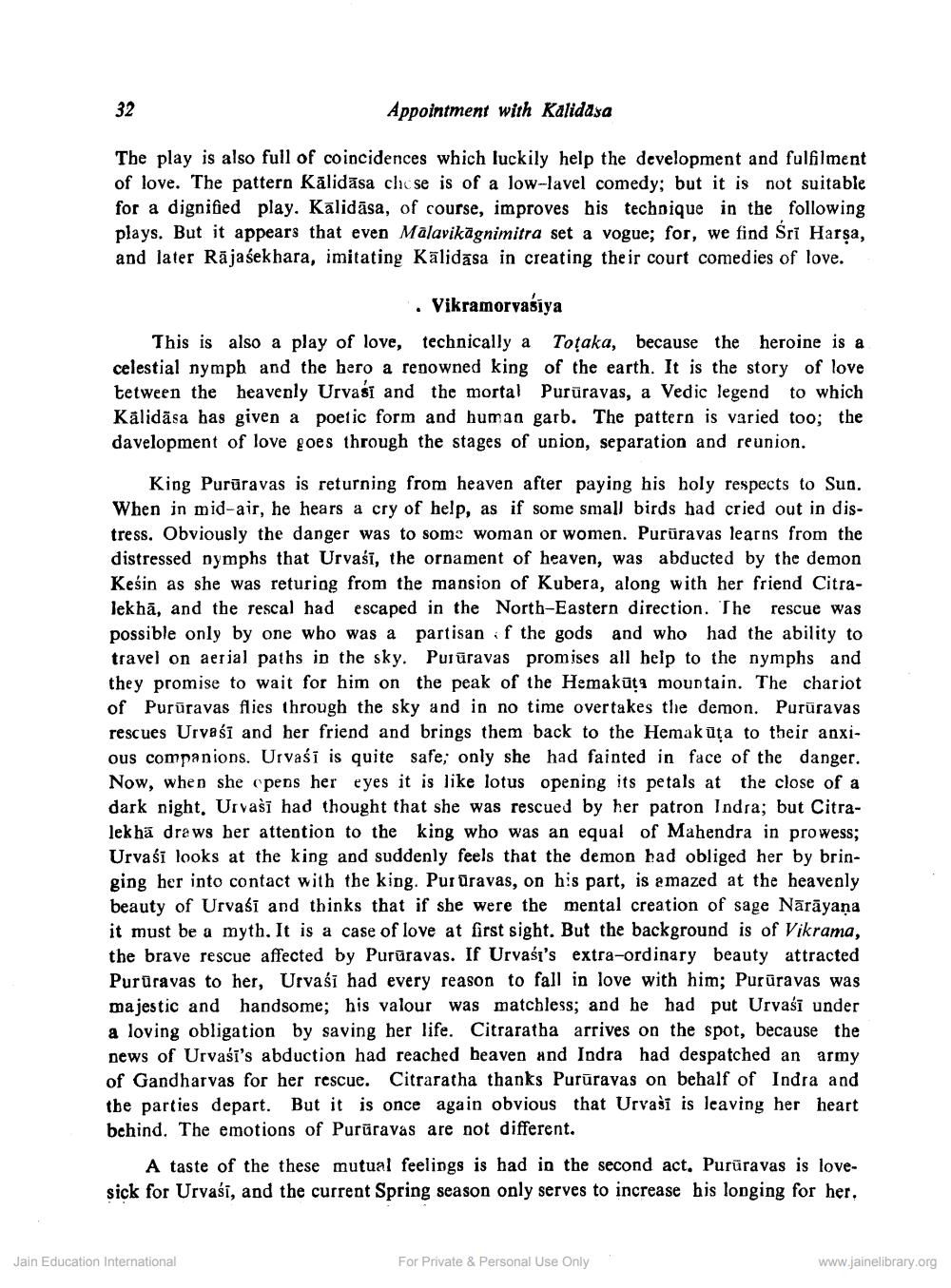________________
32
Appointment with Kalidasa
The play is also full of coincidences which luckily help the development and fulfilment of love. The pattern Kālidāsa chce is of a low-lavel comedy; but it is not suitable for a dignified play. Kālidāsa, of course, improves his technique in the following plays. But it appears that even Malavikāgnimitra set a vogue; for, we find Sri Harsa, and later Rājasekhara, imitating Kālidāsa in creating their court comedies of love.
Vikramorvasiya This is also a play of love, technically a Toțaka, because the heroine is a celestial nymph and the hero a renowned king of the earth. It is the story of love tetween the heavenly Urvasi and the mortal Purūravas, a Vedic legend to which Kālidāsa has given a poetic form and human garb. The pattern is varied too; the davelopment of love goes through the stages of union, separation and reunion.
King Purūravas is returning from heaven after paying his holy respects to Sun. When in mid-air, he hears a cry of help, as if some small birds had cried out in distress. Obviously the danger was to some woman or women. Purūravas learns from the distressed nymphs that Urvašī, the ornament of heaven, was abducted by the demon Kesin as she was returing from the mansion of Kubera, along with her friend Citralekhā, and the rescal had escaped in the North-Eastern direction. The rescue was possible only by one who was a partisan if the gods and who had the ability to travel on aerial paths in the sky. Puiūravas promises all help to the nymphs and they promise to wait for him on the peak of the Hemakūta mountain. The chariot of Purūravas flies through the sky and in no time overtakes the demon. Purūravas rescues Urvaśī and her friend and brings them back to the Hemakūța to their anxious companions. Urvasi is quite safe; only she had fainted in face of the danger. Now, when she cpens her eyes it is like lotus opening its petals at the close of a dark night. Urvašī had thought that she was rescued by her patron Indra; but Citralekhā draws her attention to the king who was an equal of Mahendra in prowess; Urvasi looks at the king and suddenly feels that the demon had obliged her by bringing her into contact with the king. Pur üravas, on his part, is amazed at the heavenly beauty of Urvaśī and thinks that if she were the mental creation of sage Nārāyana it must be a myth. It is a case of love at first sight. But the background is of Vikrama, the brave rescue affected by Purūravas. If Urvasi's extra-ordinary beauty attracted Purūravas to her, Urvasi had every reason to fall in love with him; Purūravas was majestic and handsome; his valour was matchless; and he had put Urvaśī under a loving obligation by saving her life. Citraratha arrives on the spot, because the news of Urvasi's abduction had reached heaven and Indra had despatched an army of Gandharvas for her rescue. Citraratha thanks Purūravas on behalf of Indra and the parties depart. But it is once again obvious that Urvasi is leaving her heart behind. The emotions of Purūravas are not different.
A taste of the these mutual feelings is had in the second act. Purūravas is lovesick for Urvasi, and the current Spring season only serves to increase his longing for her.
Jain Education International
For Private & Personal Use Only
www.jainelibrary.org




